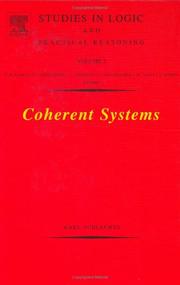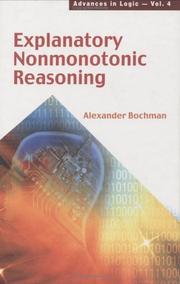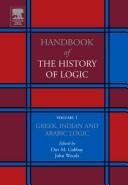| Listing 1 - 5 of 5 |
Sort by
|

ISBN: 1281119792 9786611119799 1423709349 0080502199 0444517898 Year: 2004 Publisher: Amsterdam ; Boston : Elsevier,
Abstract | Keywords | Export | Availability | Bookmark
 Loading...
Loading...Choose an application
- Reference Manager
- EndNote
- RefWorks (Direct export to RefWorks)
One aspect of common sense reasoning is reasoning about normal cases, e.g. a physician will first try to interpret symptoms by a common disease, and will take more exotic possibilities only later into account. Such ""normality"" can be encoded, e.g. bya relation, where case A is considered more normal than case B. This gives a standard semantics or interpretation to nonmonotonic reasoning (a branch of common sense reasoning), or, more formally, to nonmonotonic logics. We consider in this book the repercussions such normality relations and similarconstructions have on the resulting nonm
Nonmonotonic reasoning. --- Algebraic logic. --- Semantics --- Modality (Logic) --- Mathematical models. --- Modal logic --- Logic --- Nonclassical mathematical logic --- Bisimulation --- Mathematical linguistics --- Logic, Symbolic and mathematical --- Non-monotonic reasoning --- Reasoning
Book
ISBN: 1283379929 9786613379924 1400843014 9781400843015 9781283379922 Year: 2007 Publisher: Princeton, N.J. : Princeton University Press,
Abstract | Keywords | Export | Availability | Bookmark
 Loading...
Loading...Choose an application
- Reference Manager
- EndNote
- RefWorks (Direct export to RefWorks)
Building theories of organizations is challenging: theories are partial and "folk" categories are fuzzy. The commonly used tools--first-order logic and its foundational set theory--are ill-suited for handling these complications. Here, three leading authorities rethink organization theory. Logics of Organization Theory sets forth and applies a new language for theory building based on a nonmonotonic logic and fuzzy set theory. In doing so, not only does it mark a major advance in organizational theory, but it also draws lessons for theory building elsewhere in the social sciences. Organizational research typically analyzes organizations in categories such as "bank," "hospital," or "university." These categories have been treated as crisp analytical constructs designed by researchers. But sociologists increasingly view categories as constructed by audiences. This book builds on cognitive psychology and anthropology to develop an audience-based theory of organizational categories. It applies this framework and the new language of theory building to organizational ecology. It reconstructs and integrates four central theory fragments, and in so doing reveals unexpected connections and new insights.
Organizational sociology --- Nonmonotonic reasoning. --- Categories (Philosophy) --- Predicaments (Categories) --- Knowledge, Theory of --- Logic --- Ontology --- Predicate (Logic) --- Non-monotonic reasoning --- Reasoning --- Organization (Sociology) --- Organization theory --- Sociology of organizations --- Sociology --- Bureaucracy --- Methodology. --- Nonmonotonic reasoning --- Methodology --- E-books
Periodical
ISSN: 18726801 01650114 Year: 1978 Publisher: [Amsterdam] : Elsevier Science
Abstract | Keywords | Export | Availability | Bookmark
 Loading...
Loading...Choose an application
- Reference Manager
- EndNote
- RefWorks (Direct export to RefWorks)
Fuzzy systems --- Fuzzy sets --- Ensembles flous --- Systèmes flous --- Fuzzy sets. --- Mathematics. --- Périodiques. --- aggregation operations --- non-additive uncertainty theory --- possibility theory --- linguistic modelling --- numerical modeling fuzzy rule-based systems --- category theory --- topology --- data fusion --- interpolative reasoning --- non-monotonic reasoning --- logic programming --- constraint-di --- Systems, Fuzzy --- Sets, Fuzzy --- System analysis --- Fuzzy logic --- Fuzzy mathematics --- Set theory

ISBN: 1281372544 9786611372545 9812567801 9789812567802 9789812561015 9812561013 Year: 2005 Volume: v. 4 Publisher: Hackensack, NJ : World Scientific,
Abstract | Keywords | Export | Availability | Bookmark
 Loading...
Loading...Choose an application
- Reference Manager
- EndNote
- RefWorks (Direct export to RefWorks)
Many approaches in the field of nonmonotonic and ""commonsense"" reasoning are actually different representations of the same basic ideas and constructions. This book gives a logical formalization of the original, explanatory approach to nonmonotonic reasoning. It uses the basic formalism of biconsequence relations, as well as derived systems of default, autoepistemic and causal inference, to cover in a single framework such diverse systems as default logic, autoepistemic and modal nonmonotonic logics, input/output and causal logics, argumentation theory, and semantics of general logic program
Nonmonotonic reasoning. --- Artificial intelligence. --- AI (Artificial intelligence) --- Artificial thinking --- Electronic brains --- Intellectronics --- Intelligence, Artificial --- Intelligent machines --- Machine intelligence --- Thinking, Artificial --- Bionics --- Cognitive science --- Digital computer simulation --- Electronic data processing --- Logic machines --- Machine theory --- Self-organizing systems --- Simulation methods --- Fifth generation computers --- Neural computers --- Non-monotonic reasoning --- Reasoning --- Nonmonotonic reasoning --- E-books

ISBN: 9780444515964 0444515968 9780444504661 9780444516251 9780444516251 9780444516107 9780444516206 9780444516213 9780444516220 9780444516237 9780444529374 0444516220 1280630930 9781280630934 0080463037 9780080463032 0444516204 9780080885476 0080885470 1281144932 9781281144935 0444504664 0444516255 9780444516114 0444516115 0444516107 0444516212 0444516239 9780444529367 0444529365 0444529373 9780080931692 0080931693 1283134039 9781283134033 9786613134035 9786610630936 9786611028978 1281028975 008054939X 9786611054625 1281054623 0080532861 9786611189518 1281189510 0080560857 9786613611741 1280581964 0080930662 0080931707 1283734249 Year: 2012 Publisher: Amsterdam ; London : North Holland,
Abstract | Keywords | Export | Availability | Bookmark
 Loading...
Loading...Choose an application
- Reference Manager
- EndNote
- RefWorks (Direct export to RefWorks)
The Handbook of the History of Logic is a multi-volume research instrument that brings to the development of logic the best in modern techniques of historical and interpretative scholarship. It is the first work in English in which the history of logic is presented so extensively. The volumes are numerous and large. Authors have been given considerable latitude to produce chapters of a length, and a level of detail, that would lay fair claim on the ambitions of the project to be a definitive research work. Authors have been carefully selected with this aim in mind. They and the Editors join
Logic --- Logique --- History. --- Histoire --- Induction (Logic) --- Philosophy --- History --- Logic. --- Argumentation --- Deduction (Logic) --- Deductive logic --- Dialectic (Logic) --- Logic, Deductive --- Intellect --- Psychology --- Science --- Reasoning --- Thought and thinking --- Methodology --- Set theory. --- Logic, Symbolic and mathematical. --- Many-valued logic. --- Nonmonotonic reasoning. --- Algebra of logic --- Logic, Universal --- Mathematical logic --- Symbolic and mathematical logic --- Symbolic logic --- Mathematics --- Algebra, Abstract --- Metamathematics --- Set theory --- Syllogism --- Aggregates --- Classes (Mathematics) --- Ensembles (Mathematics) --- Mathematical sets --- Sets (Mathematics) --- Theory of sets --- Logic, Symbolic and mathematical --- Non-monotonic reasoning --- Logic, Many-valued --- Logic, Multivalued --- Logic, Variable-valued --- Multivalued logic --- Variable-valued logic --- Nonclassical mathematical logic --- Values
| Listing 1 - 5 of 5 |
Sort by
|

 Search
Search Feedback
Feedback About UniCat
About UniCat  Help
Help News
News